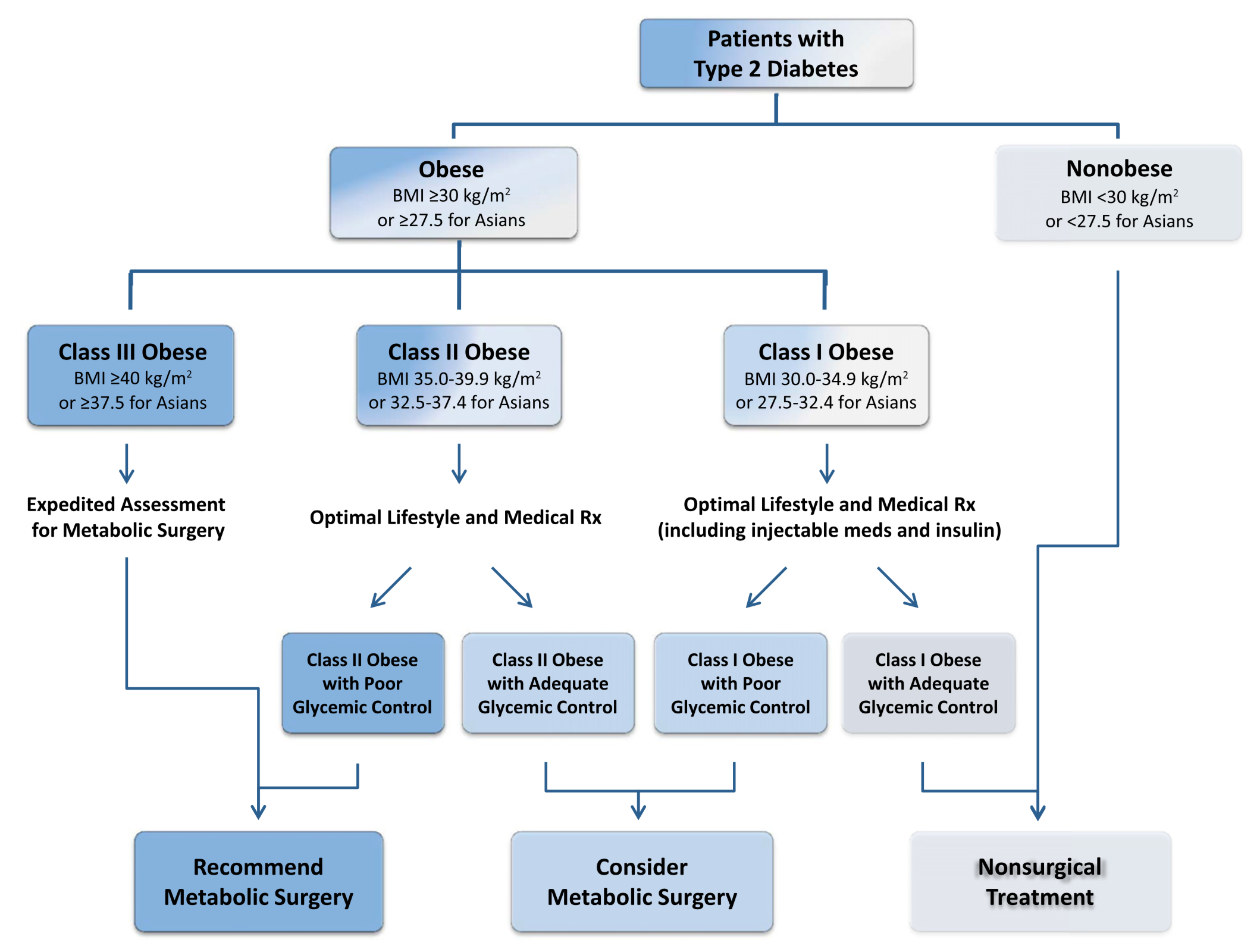Metabolic Surgery for Diabetes
All the modern stapled bariatric operations have a direct metabolic effect on diabetic control. These include the sleeve gastrectomy, bypasses including Roux-en-Y, single anastomosis, SIPS and the gastric bipartition procedures. Some are better than others but tend to come with a potential for increased side effects and complications.
How is metabolic surgery used to treat diabetes?
To understand metabolic surgery we need some background on diabetes as a condition. There are two main types of diabetes. These are;
-
Type 1 Diabetes is an auto-immune condition where the cells in the pancreas that produce insulin are destroyed by the bodies immune system. It usually develops in childhood.
-
Type 2 Diabetes is predominately a modern lifestyle disease associated with obesity and the development of insulin resistance. (There are newly recognised subtypes of diabetes which seem to be variants of type 2)
In addition to the two main types of diabetes, there is also the Pre-Diabetic condition.
Although not yet classified as diabetic, pre-diabetes is a condition where an individual's blood sugar levels (glucose) are consistently higher than normal but are not out of control. Prior to the glucose becoming persistantly high these individuals usually have very high circulating insulin levels which are needed just to try and keep the glucose level normal. These patients are at a very high risk of developing Type II diabetes in the near future if they do not make the necessary lifestyle changes.
Metabolic Surgery for Diabetes
Chronic health condition
Diabetes is a chronic health condition that is extremely serious and complex. It is associated with:
- a high risk of cardiovascular disease (heart attacks and strokes)
- kidney disease
- loss of eyesight
- limb amputation
- chronic non-healing wounds
Type II diabetes is increasing at alarming rates in first world countries. This is due largely to the obesity epidemic resulting from easily accessed processed foods and a more sedentary lifestyle.
Metabolic surgery has been long recognised to reverse Type 2 diabetes and prevent a pre-diabetic individual from developing Type 2 diabetes in the future. The weight loss from surgery and subsequent dietary restrictions help. However, the majority of the effect is from the hormonal, receptor and metabolic effects occurring directly from surgery.
Bariatric surgery can not reverse or have a direct impact on the autoimmune factors causing Type 1 diabetes. However, the hormonal, receptor and metabolic effects which then lead to weight loss can improve the control and/or reduce the medication usage for Type 1 diabetics as well.
"Operations will have an immediate effect on glucose control. Often, patients leave the hospital on significantly lower medications, including insulin. Sometimes, patients leave the hospital without needing any further diabetic medication at all. In fact, I distinctly remember a patient on 330 units of insulin a day leaving the hospital on day 3 requiring no insulin at all."
Types of metabolic surgery for diabetes treatment
The surgeons at Upper GI West will offer the most suitable bariatric procedure for you.
This will be a well informed, educated decision taking into account your overall health, comorbidities and your suitability for surgery.
“Stapled operations have a direct metabolic effect on diabetic control. These include the sleeve gastrectomy, Roux-en-Y gastric bypass, single anastomosis gastric bypass, SIPS/SADI duodenal switch and the gastric bipartition procedures. A gastric band does not have a direct hormonal effect on diabetic control. However, weight loss in conjunction with all procedures helps with diabetic control.”
The most effective procedure for controlling diabetes is a duodenal switch procedure. Data shows that almost 90% of patients having this procedure are in remission even 10 years later.
Research shows that the longer amount of intestine bypassed has a more powerful hormonal and metabolic effect and is more likely to "cure" or put your diabetes into remission. This should be balanced against the additional risks it causes including vitamin and mineral deficiencies which require lifelong supplementation.
W.J. Pories, a surgeon physician from the USA published a scholarly article in the Annals of Surgery as far back as 1995 titled " Who Would Have Thought it? An operation proves to be the most effective therapy for adult - onset diabetes mellitus".
Consensus statements and guidelines published following the 2nd Diabetes Surgery Summit (DSS-II) held in London in 2015 have now been endorsed by 45 leading professional medical and surgical societies around the world. Metabolic surgery should be considered in type 2 diabetics with a BMI >30 (or BMI > 27.5 in Asians).

Metabolic Surgery in the Treatment Algorithm for Type 2 Diabetes: A Joint Statement by International Diabetes Organizations Diabetes Care 2016;39:861–877
Who should perform anti-diabetic/metabolic surgery?
The surgeons at Upper GI West are highly qualified Upper Gastrointestinal and Bariatric Surgeons. After finishing General Surgical training and being recognised as consultants they all went on and furthered their skills by undertaking at least an additional two years of intensive advanced surgical training specialising in Upper Gastrointestinal Surgery. More specifically they all completed their additional training in surgery of the oesophagus and stomach as well as advanced endoscopy. This makes them some of the most qualified surgeons in Perth to perform Bariatric Surgery and to deal with complications should they occur.
The Upper GI organs are the oesophagus, stomach, duodenum, small intestine, liver, gall bladder, bile ducts, pancreas and spleen. Bariatric and metabolic surgery involves removing, stapling and joining the stomach or duodenum to the small intestine. Complications can involve injury to these organs as well as the oesophagus, spleen, liver, bile ducts and pancreas. The treatment of complications may involve joining intestine to the oesophagus or operating in the chest (which is not part of general surgical training) and the use of advanced endoscopy techniques.
Upper GI West firmly believe that surgeons with that additional training are best placed to carry out metabolic or diabetes surgery. Our experience with laparoscopic and open surgery is shared and we build on the latest international research in this area to keep improving our clinical outcomes. Our range of surgical experience includes obesity surgery, diabetes surgery, cancer surgery and procedures for more benign conditions of the upper GI tract. For your surgery, you deserve to be in experienced hands.
“Our highly qualified team of surgeons work closely together. We liaise extensively on complex cases. In some more complex cases, we work together to carry out surgery. We aim to ensure you are looked after 24/7 and 365 days a year .”


